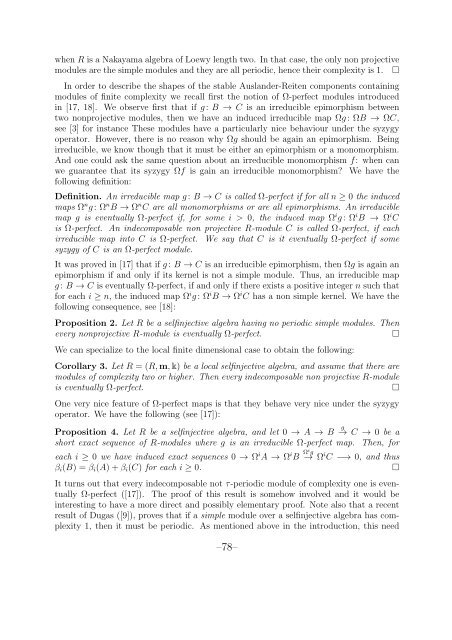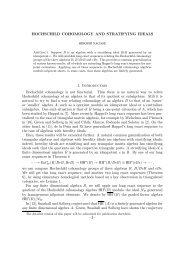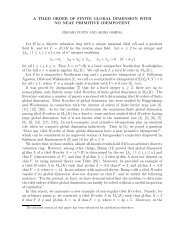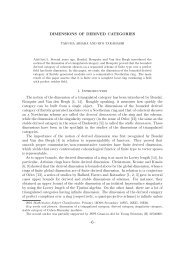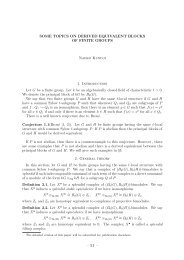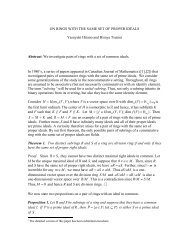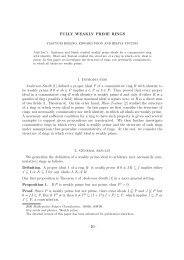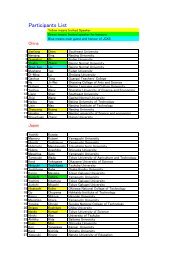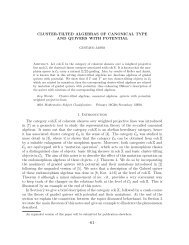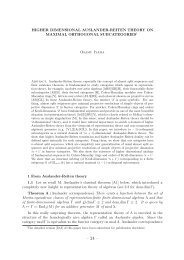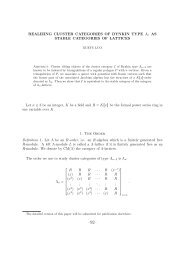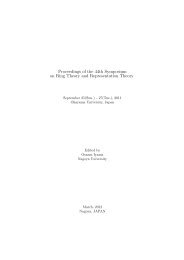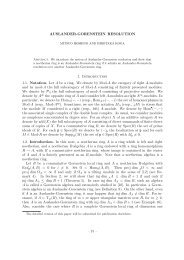Proceedings of the 44th Symposium on Ring Theory and ...
Proceedings of the 44th Symposium on Ring Theory and ...
Proceedings of the 44th Symposium on Ring Theory and ...
You also want an ePaper? Increase the reach of your titles
YUMPU automatically turns print PDFs into web optimized ePapers that Google loves.
when R is a Nakayama algebra <str<strong>on</strong>g>of</str<strong>on</strong>g> Loewy length two. In that case, <str<strong>on</strong>g>the</str<strong>on</strong>g> <strong>on</strong>ly n<strong>on</strong> projective<br />
modules are <str<strong>on</strong>g>the</str<strong>on</strong>g> simple modules <strong>and</strong> <str<strong>on</strong>g>the</str<strong>on</strong>g>y are all periodic, hence <str<strong>on</strong>g>the</str<strong>on</strong>g>ir complexity is 1. □<br />
In order to describe <str<strong>on</strong>g>the</str<strong>on</strong>g> shapes <str<strong>on</strong>g>of</str<strong>on</strong>g> <str<strong>on</strong>g>the</str<strong>on</strong>g> stable Ausl<strong>and</strong>er-Reiten comp<strong>on</strong>ents c<strong>on</strong>taining<br />
modules <str<strong>on</strong>g>of</str<strong>on</strong>g> finite complexity we recall first <str<strong>on</strong>g>the</str<strong>on</strong>g> noti<strong>on</strong> <str<strong>on</strong>g>of</str<strong>on</strong>g> Ω-perfect modules introduced<br />
in [17, 18]. We observe first that if g : B → C is an irreducible epimorphism between<br />
two n<strong>on</strong>projective modules, <str<strong>on</strong>g>the</str<strong>on</strong>g>n we have an induced irreducible map Ωg : ΩB → ΩC,<br />
see [3] for instance These modules have a particularly nice behaviour under <str<strong>on</strong>g>the</str<strong>on</strong>g> syzygy<br />
operator. However, <str<strong>on</strong>g>the</str<strong>on</strong>g>re is no reas<strong>on</strong> why Ωg should be again an epimorphism. Being<br />
irreducible, we know though that it must be ei<str<strong>on</strong>g>the</str<strong>on</strong>g>r an epimorphism or a m<strong>on</strong>omorphism.<br />
And <strong>on</strong>e could ask <str<strong>on</strong>g>the</str<strong>on</strong>g> same questi<strong>on</strong> about an irreducible m<strong>on</strong>omorphism f: when can<br />
we guarantee that its syzygy Ωf is gain an irreducible m<strong>on</strong>omorphism? We have <str<strong>on</strong>g>the</str<strong>on</strong>g><br />
following definiti<strong>on</strong>:<br />
Definiti<strong>on</strong>. An irreducible map g : B → C is called Ω-perfect if for all n ≥ 0 <str<strong>on</strong>g>the</str<strong>on</strong>g> induced<br />
maps Ω n g : Ω n B → Ω n C are all m<strong>on</strong>omorphisms or are all epimorphisms. An irreducible<br />
map g is eventually Ω-perfect if, for some i > 0, <str<strong>on</strong>g>the</str<strong>on</strong>g> induced map Ω i g : Ω i B → Ω i C<br />
is Ω-perfect. An indecomposable n<strong>on</strong> projective R-module C is called Ω-perfect, if each<br />
irreducible map into C is Ω-perfect. We say that C is it eventually Ω-perfect if some<br />
syzygy <str<strong>on</strong>g>of</str<strong>on</strong>g> C is an Ω-perfect module.<br />
It was proved in [17] that if g : B → C is an irreducible epimorphism, <str<strong>on</strong>g>the</str<strong>on</strong>g>n Ωg is again an<br />
epimorphism if <strong>and</strong> <strong>on</strong>ly if its kernel is not a simple module. Thus, an irreducible map<br />
g : B → C is eventually Ω-perfect, if <strong>and</strong> <strong>on</strong>ly if <str<strong>on</strong>g>the</str<strong>on</strong>g>re exists a positive integer n such that<br />
for each i ≥ n, <str<strong>on</strong>g>the</str<strong>on</strong>g> induced map Ω i g : Ω i B → Ω i C has a n<strong>on</strong> simple kernel. We have <str<strong>on</strong>g>the</str<strong>on</strong>g><br />
following c<strong>on</strong>sequence, see [18]:<br />
Propositi<strong>on</strong> 2. Let R be a selfinjective algebra having no periodic simple modules. Then<br />
every n<strong>on</strong>projective R-module is eventually Ω-perfect.<br />
□<br />
We can specialize to <str<strong>on</strong>g>the</str<strong>on</strong>g> local finite dimensi<strong>on</strong>al case to obtain <str<strong>on</strong>g>the</str<strong>on</strong>g> following:<br />
Corollary 3. Let R = (R, m, k) be a local selfinjective algebra, <strong>and</strong> assume that <str<strong>on</strong>g>the</str<strong>on</strong>g>re are<br />
modules <str<strong>on</strong>g>of</str<strong>on</strong>g> complexity two or higher. Then every indecomposable n<strong>on</strong> projective R-module<br />
is eventually Ω-perfect.<br />
□<br />
One very nice feature <str<strong>on</strong>g>of</str<strong>on</strong>g> Ω-perfect maps is that <str<strong>on</strong>g>the</str<strong>on</strong>g>y behave very nice under <str<strong>on</strong>g>the</str<strong>on</strong>g> syzygy<br />
operator. We have <str<strong>on</strong>g>the</str<strong>on</strong>g> following (see [17]):<br />
Propositi<strong>on</strong> 4. Let R be a selfinjective algebra, <strong>and</strong> let 0 → A → B → g C → 0 be a<br />
short exact sequence <str<strong>on</strong>g>of</str<strong>on</strong>g> R-modules where g is an irreducible Ω-perfect map. Then, for<br />
each i ≥ 0 we have induced exact sequences 0 → Ω i A → Ω i B Ωi g<br />
→ Ω i C −→ 0, <strong>and</strong> thus<br />
β i (B) = β i (A) + β i (C) for each i ≥ 0.<br />
□<br />
It turns out that every indecomposable not τ-periodic module <str<strong>on</strong>g>of</str<strong>on</strong>g> complexity <strong>on</strong>e is eventually<br />
Ω-perfect ([17]). The pro<str<strong>on</strong>g>of</str<strong>on</strong>g> <str<strong>on</strong>g>of</str<strong>on</strong>g> this result is somehow involved <strong>and</strong> it would be<br />
interesting to have a more direct <strong>and</strong> possibly elementary pro<str<strong>on</strong>g>of</str<strong>on</strong>g>. Note also that a recent<br />
result <str<strong>on</strong>g>of</str<strong>on</strong>g> Dugas ([9]), proves that if a simple module over a selfinjective algebra has complexity<br />
1, <str<strong>on</strong>g>the</str<strong>on</strong>g>n it must be periodic. As menti<strong>on</strong>ed above in <str<strong>on</strong>g>the</str<strong>on</strong>g> introducti<strong>on</strong>, this need<br />
–78–


